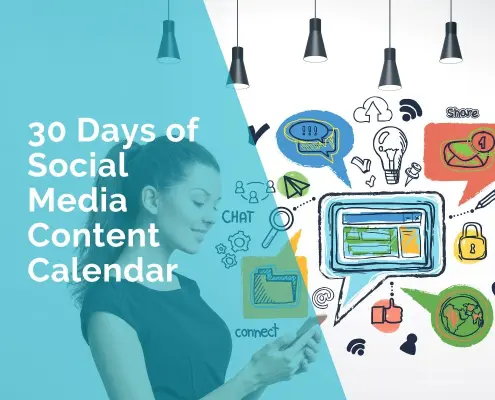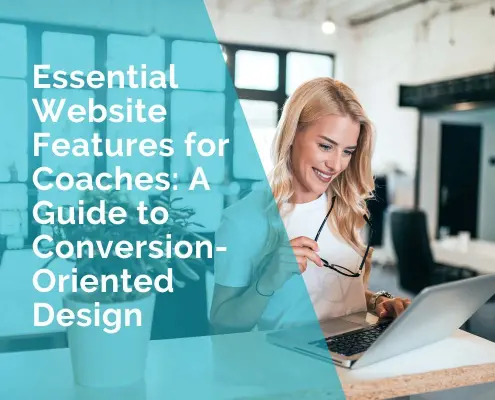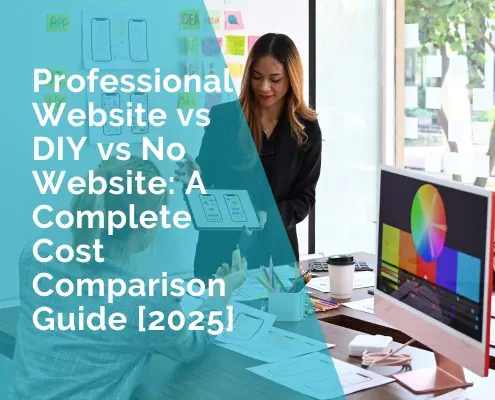Paid Search Ads vs. Organic Search: Understanding The Differences And Benefits
Businesses today have many tools to capture the attention of potential customers. Two of the most effective strategies are paid search advertising (ads) and organic search. But which one is right for your business?
Whether you’re a seasoned marketer or just starting out, this guide will help you understand the differences and benefits of paid search ads and organic search. Read on to create brand awareness, drive traffic, and boost your bottom line with the right Search Engine Marketing (SEM) strategy!
What Is Paid Advertising?
Have you ever noticed a top listing with a little Ad label when you search for something online? Well, that’s paid search ads or Pay-Per-Click (PPC) in action. Businesses pay search engines, such as Google, to display their promotions on the result pages when users search for relevant keywords. These eye-catching ads appear on top or bottom of the Search Engine Results Page (SERP), clearly labelled and marked as ads.
For instance, say you run a bakery and want to advertise your delicious cakes. With paid search ads, your attractive offer pops up when locals search for keywords, such as “birthday cakes near me.” The best part is that you only pay when someone clicks on the ad (Cost-Per-Click (CPC), giving you a direct line to interested customers.
Benefits Of Paid Search Advertising
The advantages of using PPC ads for your business include:
Immediate Visibility And Traffic
PPC marketing offers a fast solution for making your business visible and driving more traffic to your website. This advertising approach is golden for new companies or product launches that need an immediate boost.
With the correct keyword targeting and budget, your ad campaign can quickly skyrocket to the top of the search results page. That coveted top spot is a direct line to ad clicks from motivated buyers looking for similar services—no more waiting months or even years to slowly build organic rankings.
For example, say you’re unveiling a new app but lack an established online presence. Paid search places your big launch front and centre the moment it hits the market. Or if you run seasonal sales – paid ads ensure your limited-time offers get seen at the right moment by interested shoppers.
Precise Targeting
Gone are the days of blasting generic ads into the void. The true power of PPC marketing lies in precision targeting that ensures your promotions reach the right users at the right time. With search platforms like Google search ads, you can zero in on your ideal customer using specific keywords, geographic locations, demographics like age or income level, and even the devices they use.
A trendy boutique, for instance, could easily target locals searching for “women’s summer dresses” on mobile. A plumber, on the other hand, might aim for homeowners hunting for “drain uncloggers near me.” This maximises their advertising Return On Investment (ROI) by eliminating guesswork and reaching the ideal audience every time.
Budget Control
With paid responsive search ads, you’re the boss of your budget. Set a daily or monthly limit and tweak it whenever you want. This freedom lets small businesses keep a tight grip on advertising costs, ensuring they don’t overshoot their target spend.
For instance, if you run a seaside cafe, you could increase your budget during peak tourist seasons and dial it back in the off-months. Or, if you’re launching a new product line, temporarily bump up your budget to drive more traffic and increase the conversion rate.
The key is having full command of your advertising dollars. This will allow you to optimise your online visibility and revenue potential without breaking the bank.
Measurable Return On Investment
When businesses invest in online advertising, they want to know their money is well-spent. That’s why the best ad platforms give you complex data on how your search campaign performs.
You can track everything from clicks and website visits to sales and revenue generated. Say you sell kitchen appliances and run search ads for “refrigerators.” With detailed metrics displayed in a Google Ads dashboard template, you can see how many people clicked, how many bought products, and what you earned from that appliance ads.
This transparency allows you to make informed choices instead of guessing. They can double down on the ads driving purchases and ditch the ones that don’t deliver. No more wondering if your online promotions pay off – you get measurable proof of their real-world impact.
A/B Testing
Savvy businesses constantly experiment with their online advertising to see what works best. You can run A/B tests to determine which ad versions resonate with different people. This split testing helps them find the most clickable headlines, keywords, and targeting options that drive sales.
For example, a hiking gear company could test Facebook ads – one using “outdoor adventure” and the other “trail exploits” in the headline. Whichever gets more clicks is the winner. With constant tweaking based on user behaviour, companies can maximise their ad spending and earn higher returns.
What Is Organic Search?
While paid ads offer visibility, there’s an organic path to online success. Organic results are the unpaid listings deemed most relevant and trustworthy by search engines for queries. So, how do businesses rise organically?
Strategic Search Engine Optimisation (SEO) is the key to organic search. This involves fine-tuning websites with the right keywords, quality content, and optimal User Experience (UX) to appeal to search algorithms. Earned backlinks from reputable sites and positive engagement signals like low bounce rates boost a site’s credibility.
However, it’s an ever-evolving landscape as search engines frequently update ranking criteria to improve accuracy. So, if you want to stay on top, appearing as an unsponsored result, master organic search.
Benefits Of Organic Search
Using organic search for your online content also pays dividends. Some of its benefits include the following:
Cost-Effectiveness
When it comes to driving website traffic, paying for every click adds up over time. That’s why many businesses leverage organic search as a cost-effective marketing strategy. While optimising your site and creating great content takes some initial effort, those search rankings keep delivering free visitors month after month once you build your online presence.
Take a landscaping company that blogs about lawn care tips, for instance. With some search engine optimisation know-how, their grass-growing guides could show up in customer searches for “healthy yards” or “lush landscaping.” Each view of those posts is a chance to acquire quality leads without overspending.
Credibility And Trust
When people search online, the top results carry an aura of credibility. They see those high rankings as a sign of quality and trustworthiness. Therefore, as a savvy brand, you should focus on boosting your organic search visibility.
Think about it – if you needed a plumber, would you trust the first few listings on Google or the companies buried on page 10? Most users assume the highest-ranked businesses must be the best at what they do.
By achieving solid organic rankings for relevant keywords like “reliable plumbers” or “expert drain uncloggers,” a plumbing company can cement its reputation as the go-to pro in town. Those prime search positions breed familiarity, positive associations, and loyal customers.
Higher Click-Through Rate
Organic search results typically receive a higher Click-Through Rate (CTR) than paid ads, as users trust and engage with organic listings over PPC advertising. This translates to higher CTR for websites ranking higher on search engines.
For example, if you were looking to buy a new coffee maker, you’d likely click on an organic listing for a review site rather than a sponsored ad. By optimising your content and improving your search rankings, you can drive more qualified traffic from people actively seeking out your products or services.
Comprehensive Insights
Analysing organic search performance gives you helpful insights into user behaviour, search trends, and content effectiveness. For instance, you can find out which keyword phrase your audience searches for, which landing page draws the most traffic, and how visitors engage with your content.
Such know-how will help you redirect your SEM efforts. By knowing what your audience wants, you can create targeted content that boosts your search rankings and engages your audience. With this information, you can make informed decisions, refine your approach, and achieve better results in your digital marketing efforts.
Differences Between Paid Search Advertising And Organic Search
As discussed, PPC ads and organic search have different benefits and shortcomings. But if you’re still wondering what the key differences are, here are a few:
Cost Structure
The key difference lies in how you pay for traffic. With paid search ads, you need to allocate a budget to pay for every click your ads receive. On the other hand, organic search visibility comes from SEO efforts.
While SEO may require some initial investment, like optimising your website or building backlinks, you don’t have to pay for each visitor that lands on your site through organic search results.
Results Speed
Paid search marketing delivers quick results, giving your website instant visibility. However, organic search rankings take time to build. Unlike ads, improving your position in organic search results is a long-term process. It requires consistent effort and patience as you optimise your website and content over a longer period to climb the rankings gradually.
SERPs Position
The location of your listing on search results differs for paid ads versus organic rankings. Search results display paid search ads on the search page, clearly labelled as Ads, so users know it’s a sponsored listing.
In contrast, organic search results are the non-ad listings that appear below any paid ads. These organic listings aren’t marked as ad campaigns, as their ranking is determined by the search engine’s algorithm, which assesses relevance and quality.
Click-Trough Rates
People are more likely to click on organic search results than paid ads. Users generally trust the organic listings more, so they may completely ignore the paid ad listings. For example, a local plumber’s organic listing with customer reviews might get way more clicks than a generic ads service.
Content Control
With paid search ads, you can freely write the ad copy and design the landing pages however you want. On the contrary, you need to optimise the existing content on your website to match what search engines are looking for in their algorithms for organic search rankings.
Targeting Options
Paid search ads allow you to target specific audiences based on factors like demographics, location, and device type. With organic search, your targeting focuses on matching relevant keywords and user intent within your website’s content itself.
Which Strategy Is Right For Your Business?
Choosing between organic and paid ads will depend on a few key considerations. They include the following:
Budget
Your marketing budget will influence your choice of digital marketing strategy. If you have a limited budget, organic search may be the more viable option, as paid ads require ongoing investments.
Business Goals
If you want results right now, paid ads are the way to go. Need to boost sales for this quarter’s big product launch? Paid search marketing delivers instant visibility. However, for long-term brand building and steady visitor flow, focus on SEO tactics.
Industry Competition
In cut-throat industries, an effective PPC strategy may be crucial for getting your foot in the door. Think about it – if you’re launching a new online jewellery store, paying for prime ad positioning helps get those first sales rolling as you battle big-name brands. But long-term, doubling down on organic search tactics like optimising product descriptions with gemstone search terms gives you an edge over competitors lagging on SEO.
Website Age And Authority
A brand-new website needs to get noticed fast – that’s where paid Google ads shine. If you just launched an online pet store, paying for prominent ads promoting “dog toys” helps get those first orders coming in. However, you can double down on organic traffic once established.
Integrating Paid Search Ads And Organic Search
You can leverage both approaches to get the best search results. For instance, pay-per-click Google ads can promote your baby boutique instantly, while optimised descriptions gradually boost organic rankings for “newborn onesies. Though different, an integrated game plan gets you quickly visible via paid listings and then sustains that momentum through organic keyword relevance.
Here are some ways to combine paid ads and organic search effortlessly:
Keyword Research
You can use paid search campaigns to identify converting keywords. See which drives the most sales and incorporate them into your website’s service pages, location listings, and blogging efforts. An integrated pay-per-click and SEO game plan maximises visibility from all angles.
Remarketing
Remarketing ads are a savvy way to re-engage website visitors who didn’t make a purchase. Say, for example, someone lands on your furniture store’s “modern sofa” product page via organic search but bails. With remarketing, you can follow them around with enticing paid ads showcasing that same couch and fresh discounts. Those targeted promotions might reel them back in for the purchase.
Testing And Optimisation
Test different ad copies and landing pages to see what messages click with your customers. After you know which one resonates the most, apply them throughout your web pages to optimise your organic content.
Comprehensive Coverage
If you want to dominate the search engine results pages, combine paid ads with SEO for maximum results. This will increase the chances of capturing end-user attention and driving more traffic to your site. For instance, you can buy those prime “pizza delivery” paid ad slots at the top while organically ranking your location pages for “best pizza near me.” This double coverage maximises your real estate and visibility.
Data-Driven Decisions
Utilise data from both paid and organic search marketing campaigns to make wise decisions. Analytics metrics from both channels can paint a better picture of your search ad performance and help guide your future SEM strategy.
Final Thoughts
Deciding between paid search ads and organic search depends on your business goals, budget, and timeline. Paid search ads offer immediate visibility and targeting, making them ideal for businesses seeking quick results. Organic search provides cost-effective, sustainable traffic and builds credibility and trust over time. It’s a long-term marketing technique that rewards quality content and strong SEO practices.
Leveraging both techniques allows you to maximise your online presence, ensuring you capture immediate traffic while building a solid foundation for future growth. Whether you choose paid search, organic search, or a blend of both, understanding their unique differences and benefits will help you make informed decisions and achieve your digital marketing goals.
***
Author: NOBS












